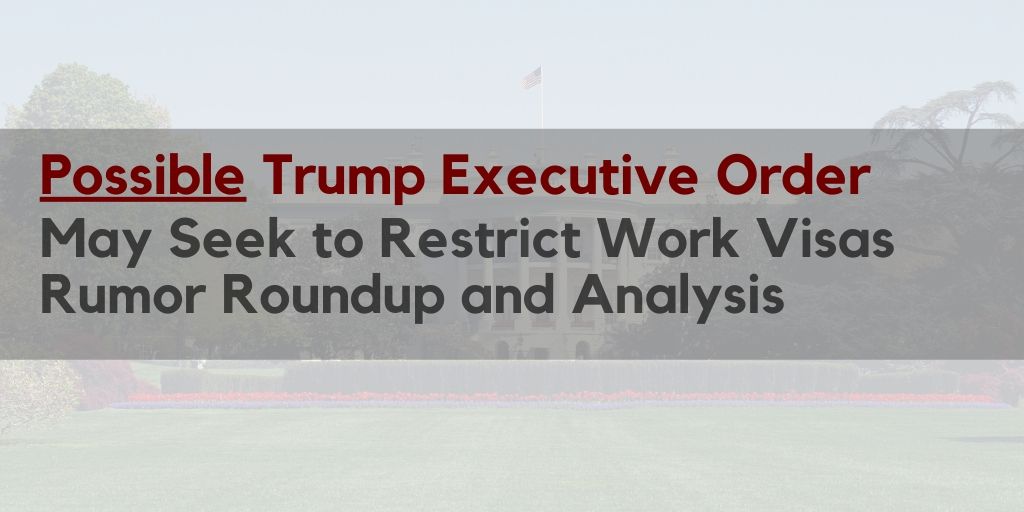Possible Executive Order Restricting Work Visas – Rumor Roundup and Analysis
Our office does not normally react to or otherwise speculate on or encourage rumors – as there have been many as far as immigration is concerned over the past years and especially over the recent months. But we feel compelled to share what we hearing from Washington with respect to some possible upcoming restrictions on some work visas. Please note that these notes and thoughts are not guaranteed to happen and are subject to change.
Overall, the administration is appearing to look for ways to restrict entry into the US for certain work visa holders for a temporary period.
Background
On April 22, 2020 the President announced bar on certain immigrants to enter the US and, as part of the same proclamation, he directed his administration to seek ways to restrict nonimmigrant visas. This is the impetus behind the current efforts by his administration to introduce restrictions on certain nonimmigrant visas, most likely limited to certain work visas.
Possible Timing
An announcement by the President may be deciding on the scope and timing of the proclamation as early as today, June 11, 2020, with possible proclamation issued before the end of June. It may remain in effect for between 90 and 180 days.
Possible Restrictions
The proclamation may seek to bar entry into the U.S. for H-1B, H-2B, L-1 and J-1 visa holders for a temporary period. One of the main intents is to target the entry of H-1B cap cases which would become effective (if approved) on October 1. There may be exemptions granted to L-1A (international managers/executives). J-1 restrictions are likely to target summer work and travel programs.
The President has stronger legal authority to do so under INA 212(f) and 215(a) and, as a result, these restrictions may be focused on restricting entry into the US and not on extensions, amendments, etc. for nonimmigrants who are already in the U.S.
Also, the proclamation may include exemptions such as healthcare workers, food supply, or for certain additional recruitment efforts (unclear what this may look like).
Possible Subsequent (and Long-Term) Regulatory Changes
Because the President’s legal authority under a proclamation is somewhat limited, it is possible that USCIS will introduce additional regulatory by rulemaking process which can be done under emergency very quickly or through the standard rulemaking/public comment process which provides for adequate notice and opportunity to comment and prepare.
If the administration uses the emergency rulemaking process, it is possible that new rules would become effective very quickly and without much advance notice.
Possible regulations may:
- Rescind the STEM OPT regulation and add additional requirements to the 12-month OPT program
- Change the H-1B regulations by focusing on the definitions of employer-employee relationship, specialty occupation, and wage levels. There has also been a discussion to substantially increase the H-1B filing fee ($20,000 or higher, in some cases).
- Rescind the H-4 EAD rule
- Rescind certain employment authorization for asylees, refugees, and TPS holders.
Conclusion: Anticipating and Preparing for Changes
Again, this is a roundup of what possible changes may result if the President decides to act on it. As of this article, none of these are set in stone or guaranteed to happen. Very likely any such changes will be challenged in court. as well. But we are sharing these possible changes to allow our readers and clients to evaluate their business needs and situations and, when possible, to act.
Businesses may consider bringing visa holders who are abroad into the U.S. sooner and may discourage international travel until we know more details. Similarly we recommend considering filing extensions, amendments, work permit renewals (such as H-4 EAD, STEM OPT) as soon as possible.
Businesses and individuals can also reach out to their representatives in Congress, to business groups or other professional (or similar) organizations to raise awareness of the (negative) economic and job creation impact on these rumored/proposed changes.
Our office will provide updates and alerts on this and related topics so please subscribe to our free weekly newsletter. Also please contact us if our office can be of any assistance.
Related News and Articles
The Capitol Immigration Law Group has been serving the business community for over 15 years and is one of the most widely respected immigration law firms focused solely on U.S. employment-based immigration. Disclaimer: we make all efforts to provide timely and accurate information; however, the information in this article may become outdated or may not be applicable to a specific set of facts. It is not to be construed as legal advice.

